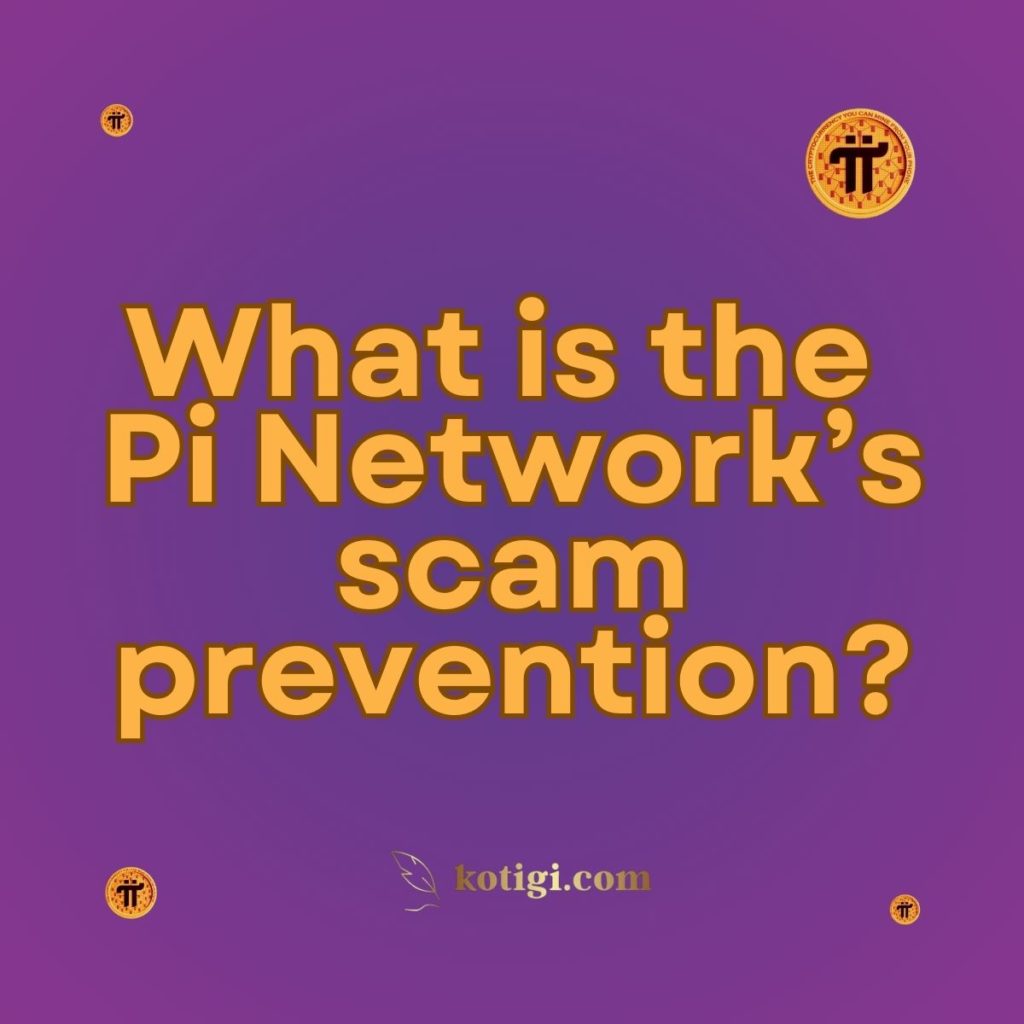
What is the Pi Network’s scam prevention?
Pi Network implements a comprehensive scam prevention strategy that includes KYC (Know Your Customer) verification, AI-powered monitoring, and educational resources for users. These measures help prevent fake accounts, phishing scams, and fraudulent activities, ensuring the platform remains secure for its millions of users.
Introduction
As Pi Network grows in popularity and attracts millions of users worldwide, it has become crucial to safeguard the platform from scams and fraud. Like any online community, Pi Network faces the risk of scams aimed at exploiting users through fraudulent schemes, fake accounts, and unauthorized access to personal information. To address these threats, Pi Network has developed a robust scam prevention framework designed to protect its ecosystem from malicious activities.
In this article, we will explore the key features of Pi Network’s scam prevention efforts and how they work together to ensure a safe environment for its users.
Key Elements of Pi Network’s Scam Prevention
KYC Verification to Prevent Fake Accounts
One of the most significant risks in any online network is the creation of fake accounts for fraudulent purposes. Scammers often use fake accounts to deceive other users, manipulate systems, or engage in phishing attacks. To combat this, Pi Network has implemented a KYC (Know Your Customer) process that requires users to verify their identities using government-issued identification.
The KYC process ensures that each user on the platform is a verified individual, which significantly reduces the possibility of scammers creating multiple fake accounts. By requiring users to go through KYC, Pi Network can better monitor the integrity of its user base and prevent scammers from exploiting the platform’s resources.
AI-Powered Monitoring and Detection
Pi Network utilizes artificial intelligence (AI) to monitor platform activity and detect unusual behavior that may indicate scams or fraudulent activities. The AI system continuously analyzes user actions and flags any suspicious patterns, such as rapid account creation, unusual transaction volumes, or repeated login attempts.
This monitoring system operates in real-time, allowing the platform to respond quickly to potential scams. If the system detects abnormal behavior, it can freeze the account or flag it for further investigation. This proactive approach helps prevent scammers from carrying out widespread attacks before they can cause significant harm.
Preventing Phishing Scams
Phishing scams are a common method used by fraudsters to steal personal information or account credentials. In phishing scams, attackers often pose as legitimate entities to trick users into providing sensitive information. To combat phishing, Pi Network emphasizes secure communication channels and user education.
Pi Network ensures that all communications with users are conducted through official, verified channels within the app or the official website. Additionally, Pi Network never requests sensitive information such as passwords, personal identification, or private keys via email or messaging apps, reducing the chances of users falling victim to phishing attempts.
Furthermore, the platform regularly educates its users on how to recognize and avoid phishing scams. By raising awareness, Pi Network empowers its community to protect themselves from potential threats.
Community-Based Scam Reporting
Collective Vigilance
Pi Network fosters a sense of collective vigilance within its community by encouraging users to report suspicious activity or scams they encounter. This community-based approach enhances the platform’s ability to detect and prevent scams. When users report potential scams, Pi Network’s security team reviews the reports and takes appropriate action, whether it’s freezing accounts, blocking malicious actors, or alerting the community to emerging threats.
By relying on its global network of users, Pi Network creates a decentralized scam detection system where users can contribute to the security of the platform.
User Education and Scam Awareness
Education is a critical component of Pi Network’s scam prevention strategy. The platform provides regular updates, guidelines, and tips to help users recognize common scams. These educational efforts include advice on avoiding phishing, recognizing fake investment opportunities, and protecting personal data.
By educating users, Pi Network empowers them to take proactive measures to protect their accounts. The platform encourages users to always be cautious when engaging with third-party entities and to verify the legitimacy of any offers, links, or requests for personal information.
Fraud Prevention Through Secure Transactions
Encryption for Data and Transactions
Pi Network ensures that all transactions and sensitive data are encrypted, making it nearly impossible for scammers to intercept or manipulate information. Encryption secures user data both during transmission and at rest, providing an additional layer of protection against unauthorized access.
When users perform transactions or send messages within the Pi Network app, encryption ensures that the information remains private and secure, reducing the likelihood of fraudulent activity.
User Control Over Transactions
Pi Network’s transaction verification process gives users complete control over their transactions. Users are notified of any transaction initiated on their account, allowing them to approve or reject the action. This transparency ensures that only authorized transactions are processed, which minimizes the risk of unauthorized transfers or scams.
This feature is particularly important for preventing scam-related transactions. If a user notices a suspicious transaction, they can reject it before it’s completed, protecting their account from potential fraud.
Staked Direct Messaging (Staked DMs) to Curb Spam
Addressing Spam and Fraud Through Staked DMs
One of Pi Network’s most innovative scam prevention tools is its Staked Direct Messaging (Staked DMs) feature, introduced to reduce spam and ensure meaningful connections within the community. In Staked DMs, users are required to stake Pi tokens when sending a message request to another user. If the recipient rejects the message, the sender forfeits their staked Pi.
This staking mechanism discourages scammers and spammers from sending unsolicited messages, as they risk losing their Pi if their message is ignored or rejected. The feature ensures that users receive only relevant and genuine messages, curbing scams and spam within the platform.
Incentivizing Constructive Communication
Staked DMs not only prevent spam but also incentivize meaningful interactions. Users are more likely to send thoughtful and relevant messages, knowing that their Pi tokens are at stake. This system creates an environment where constructive communication is encouraged, while malicious actors are deterred by the potential loss of their staked Pi.
Preventing Ponzi Schemes and Investment Scams
Promoting Genuine Ecosystem Participation
Pi Network actively discourages investment scams and Ponzi schemes, which are common in the cryptocurrency space. The platform emphasizes that Pi tokens have no monetary value until the open mainnet launch, and it educates users on the risks associated with external parties offering investment opportunities or promising financial returns on Pi.
Users are warned to be cautious of any entity offering to buy or sell Pi tokens or offering investment schemes, as these are likely to be scams. By promoting transparency and genuine participation in the ecosystem, Pi Network prevents users from falling prey to fraudulent investment schemes.
Encouraging Safe Participation
Pi Network encourages users to focus on genuine participation in the ecosystem, such as contributing to the development of apps, completing KYC, and engaging in the community. This approach minimizes the risk of users being lured into get-rich-quick schemes or falling for promises of instant wealth.
Conclusion
Pi Network’s scam prevention measures are designed to create a secure and trustworthy environment for its users. By implementing KYC verification, AI-based monitoring, encryption, and innovative features like Staked DMs, the platform effectively combats scams and fraudulent activities. Additionally, Pi Network’s focus on user education and community-based reporting strengthens its ability to detect and prevent scams.
As Pi Network continues to grow, its commitment to scam prevention ensures that users can engage with the platform confidently, knowing their accounts and data are secure.
Key Takeaways
- Pi Network uses KYC verification and AI-based monitoring to detect and prevent scams.
- Staked DMs reduce spam and ensure meaningful communication between users.
- The platform educates users on scam awareness, helping them avoid phishing and investment scams.
- Pi Network’s encrypted transactions and user-controlled verification processes prevent unauthorized activities.
- Community-based reporting encourages users to contribute to the platform’s overall security.





